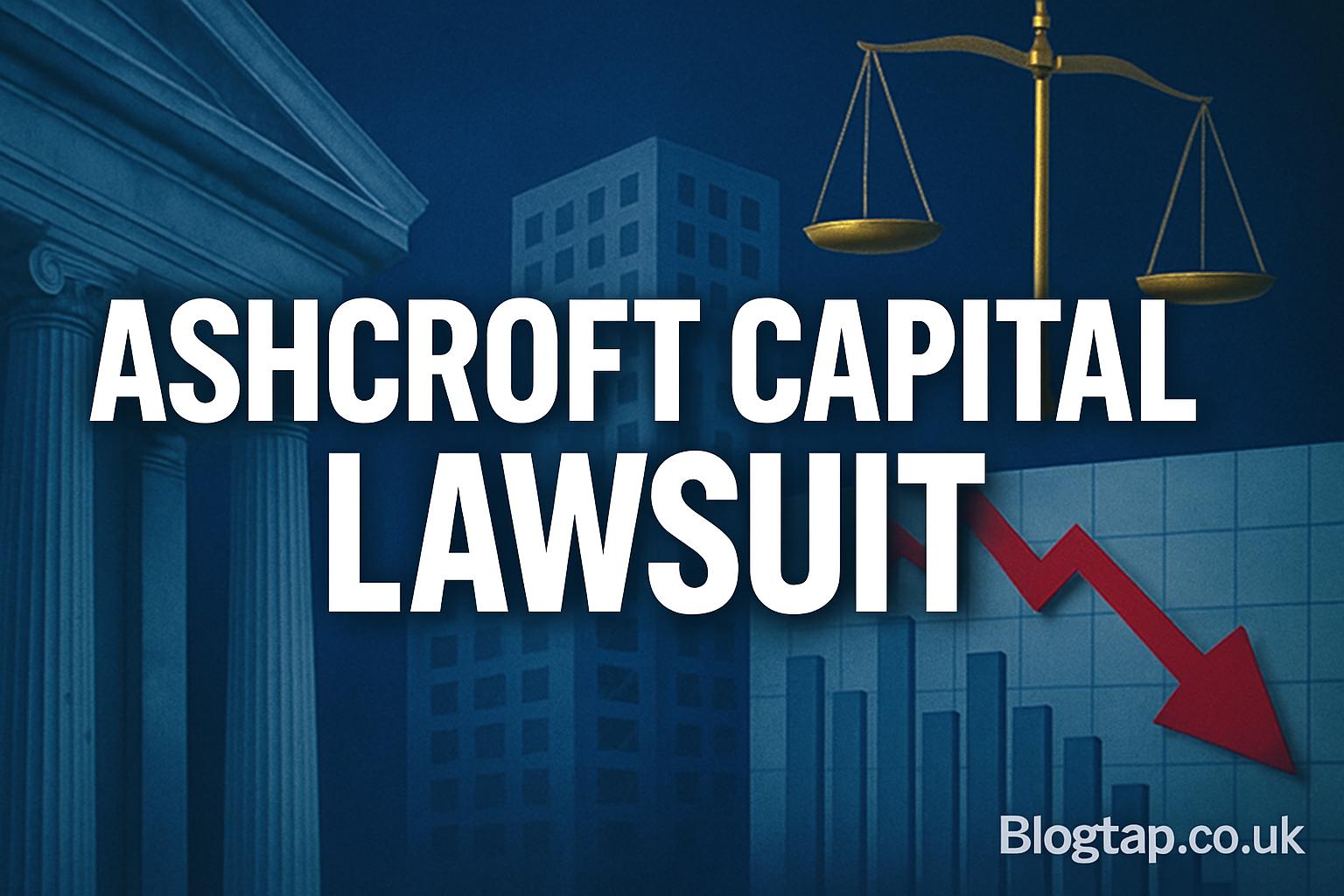Introduction
The financial world often looks stable from the outside, but sometimes big changes happen that can surprise investors. One recent case drawing attention is the Ashcroft Capital lawsuit. Filed in early 2025, this lawsuit has raised many questions about trust, investor rights, and transparency in the real estate market. For people who have invested in real estate syndications, this case is more than just news, it is a reminder to check how safe their money really is.
Background of Ashcroft Capital
Ashcroft Capital is a well-known real estate investment firm based in the United States. Founded by Frank Roessler, the company focuses mainly on multifamily properties, buying large apartment complexes, upgrading them, and then managing them for returns. Over the years, the firm attracted many accredited investors by offering strong returns and professional management.
The company built its reputation on value-add real estate strategies, where older properties are renovated and then rented at higher prices. By showing high internal rates of return (IRR), Ashcroft gained trust from thousands of investors. However, success in real estate is never without risks. Markets shift, interest rates rise, and property values can fall. The ashcroft capital lawsuit now highlights how these risks can lead to legal conflict.
How the Lawsuit Started
The lawsuit officially began on February 12, 2025, under the name Cautero v. Ashcroft Legacy Funds, LLC. It was filed by around 12 accredited investors who had invested in Ashcroft’s funds. These investors claimed that Ashcroft Capital had misled them in several ways, especially in how it reported expected profits and managed funds.
The lawsuit states that Ashcroft:
- Inflated IRR projections by 4–6%
- Failed to give clear information about risks
- Charged fees even when the funds were not performing well
- Breached fiduciary duties by putting company interests ahead of investors
Together, these investors are asking for more than $18 million in damages. This shows the seriousness of the case and explains why so many people in the real estate world are paying attention to the ashcroft capital lawsuit.
Main Allegations Against Ashcroft Capital
The allegations focus on trust and fairness. Investors believed the numbers they were shown, but later claimed those numbers were too optimistic. By promising higher returns, the company made the investments look safer and more rewarding than they truly were.
Transparency is another major issue. Investors say they were not given full details about financial risks, such as debt levels or market weaknesses. They also argue that Ashcroft continued to collect management fees even during times when funds were losing value. Finally, the lawsuit claims Ashcroft did not act in the best interest of its investors, which is a legal responsibility known as fiduciary duty.
If these claims are proven true, the court could make Ashcroft pay heavy penalties. This would not only affect the company but also send a strong message across the real estate industry.
Ashcroft Capital’s Response
Ashcroft Capital has denied the claims. The company says it followed all SEC guidelines, gave proper disclosures, and acted responsibly. Leaders at Ashcroft argue that real estate carries natural risks, and investors were made aware of those risks from the start. They also claim that market conditions, not mismanagement, caused recent problems.
In short, Ashcroft’s defense is that it acted fairly, gave the required information, and that the ashcroft capital lawsuit is an overreaction. The company is preparing to fight the case in court while also entering mediation talks to avoid a long trial.
Current Status of the Case
As of mid-2025, the case is still active. A live tracker shows updates like:
- Court orders for Ashcroft to share internal documents
- Partial document releases that caused some debate
- An affidavit filed by a former employee
- Discussions of adding another co-defendant
- Mediation talks scheduled for September 12, 2025
This means the lawsuit is still in its early stages. Both sides are building their arguments, and it may take months or even years before a final judgment is made. For now, investors are watching closely to see if a settlement happens or if the trial continues.
Why Investors Care So Much
The ashcroft capital lawsuit is not just about one company. It represents a bigger issue: how much trust investors can place in real estate syndications. Many people invest in such funds because they want access to large real estate deals without buying buildings themselves. They rely on managers like Ashcroft to handle everything fairly.
When investors feel misled, it shakes confidence in the whole industry. If a respected firm like Ashcroft faces lawsuits, others may also face more questions. This is why forums and investor groups online are full of discussions, with some investors even saying they no longer trust syndication firms as much as before.
For more insights on syndication risks, you can check Investopedia’s guide on real estate syndication.
Reactions in the Investment Community
On platforms like Reddit and Wall Street Oasis, investors have been openly discussing the lawsuit. Some say they already expected problems, while others are shocked by the scale of the claims. A few investors even admitted they are worried about upcoming capital calls when a fund asks for more money to cover losses or expenses.
The general mood is cautious. Many are waiting for more court updates, while others are considering whether to join similar legal actions. This public reaction shows that the ashcroft capital lawsuit has gone beyond the courtroom and is now shaping investor behavior more widely.
Possible Outcomes of the Lawsuit
The outcome of this case could take different paths:
- Settlement – Ashcroft may reach an agreement with the investors, paying some damages without admitting guilt. This would avoid a long trial.
- Trial Victory for Investors – If the court agrees that Ashcroft misled investors, the company could be ordered to pay millions in damages.
- Trial Victory for Ashcroft – If the court sides with Ashcroft, the company could protect its reputation, but trust issues may still remain.
- Industry Changes – No matter the result, regulators and other real estate firms may change their rules to prevent similar disputes.
Each outcome carries lessons for both companies and investors.
Lessons for Investors
The ashcroft capital lawsuit teaches investors to be careful when choosing where to put their money. Some key lessons are:
- Check disclosures carefully – Always read financial documents fully before investing.
- Ask questions – Do not be afraid to ask managers about risks, fees, and strategies.
- Diversify investments – Never put all your money into one fund or company.
- Stay informed – Follow market trends and company news to avoid surprises.
A helpful resource is the U.S. Securities and Exchange Commission investor education site, where you can learn more about safe investing practices.
Broader Impact on Real Estate Syndications
The lawsuit could also change how real estate syndications operate. Companies may need to:
- Provide clearer risk disclosures
- Share more detailed financial updates
- Change how they calculate and present IRR projections
- Be more transparent about fees
If these changes happen, the industry could become safer for investors, but managers may face higher compliance costs. Either way, the ashcroft capital lawsuit is pushing the industry toward more accountability.
For more background on IRR and returns, see Corporate Finance Institute’s explanation of IRR.
Conclusion
The ashcroft capital lawsuit is one of the most important legal cases in real estate investing this year. With $18 million at stake, investor trust on the line, and industry rules possibly changing, the outcome will affect more than just Ashcroft Capital.
For investors, the key lesson is to stay alert, ask questions, and understand risks before investing. While the final result of this lawsuit is still unknown, it has already sent a clear message: transparency and honesty are more important than ever in financial partnerships.
Relatable Topic : Cellulogia, The Website GravityInternetNet, Traceloans.com












